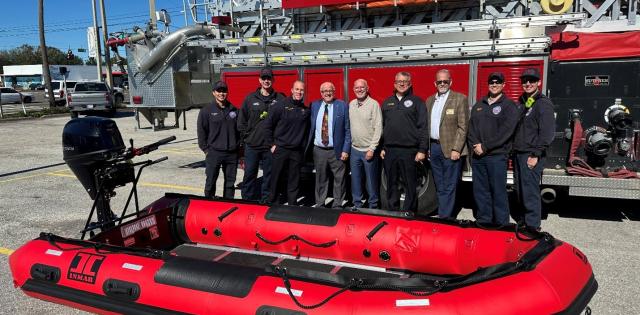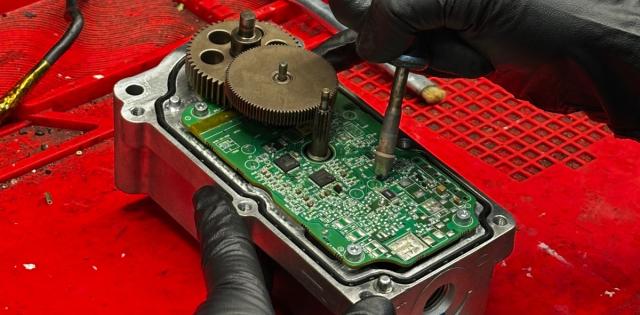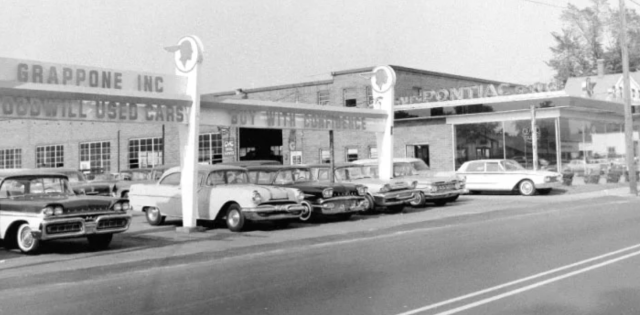Unlike many high school students, Jonathan Biggom already knew the career path that he wanted to pursue when he graduated in 2005.
“It pretty much just clicked right away during high school,” Biggom said of the vocational program he participated in during his junior and senior years. It was there that Biggom saw the prospect of becoming a service technician. “I had the opportunity to go [to college], but I didn’t want to,” Biggom said. “I’d rather do something with my hands.”
After graduation, Biggom met with advisors to arrange his enrollment in an accelerated course at a technical college to continue his training in automobile service. He finished the course and started work as a service tech at Motorcars Toyota in Cleveland, Ohio. Biggom said he started from the bottom and worked his way to the top. “You definitely see the progression. It’s rewarding,” Biggom explains in an NADA video.
Thirteen years later, Biggom is one of the senior service techs at Motorcars Toyota and mentors service technicians who are just starting out in the position.
A Career in Demand
Service techs like Biggom have made a wise—and profitable—career decision. Presently, there is a shortage of service techs in the automotive industry, leaving numerous positions available for individuals who don’t necessarily have college degrees and are looking for employment great career.
Today’s new cars, which last longer and are more technical than ever means that dealerships are relying on a well-trained, well-staffed parts and service department more than ever before. National Automobile Dealers Association data shows that 46% of dealer profit comes from the service, parts and body shop departments.
Moreover, a total of 46,000 service technicians are needed nationwide by 2026 to meet market demand, according to the U.S. Bureau of Labor Statistics.
The average salary of a service technician is already almost $10,000 higher than the average salary of a single-person household of $49,539. That income average could rise if current demands persist.
Working for a family-oriented company that pays well while having fun with his co-workers are just a few reasons that Biggom says he likes working at Motorcars Toyota. “We see our owner every day. That means a lot for us. Just working for the company itself, that’s what definitely keeps me around,” said Biggom. “Especially with the good pay as well.”
An Industry Transformed by Tech
Although Biggom was exposed to his service technician career in high school, those opportunities for future service techs are drying up as school districts cut back or eliminate vocational training programs due to budget constraints.
However, training programs are still widely available at the college level. Contra Costa College in San Pablo, California recently partnered with Toyota on a two-year program that prepares students for work at Toyota dealerships. A similar partnership between Mercedes-Benz and Jefferson Community & Technical College in Louisville, Kentucky will prepare students to become a level one Mercedes-Benz Certified Systems Technician in just three semesters. .
“The need for educational programs like these are important as we face an acute shortage of qualified technicians,” said Mercedes-Benz Vice President of Customer Service Christian Treiber. “The shortage largely comes from the outdated image of mechanics and increase in demand. Today’s mechanics must now have a completely different skillset; they are technologists that cater to increasingly complex vehicles.”
Service technician training has had to evolve as new cars have become more tied to technology. Today’s service techs don’t just maintain and repair cars anymore, they also need a working knowledge of up-to-date industry practices, including diagnosing issues with complex new automobiles that often include complicated computer software. These new cars often include operating systems with up to 100 million lines of code, which is roughly equivalent to 20 computers.
Auto technicians now work as much with their heads as they do with their hands, noted Biggom. “The biggest challenge is keeping up to date with training modules,” said Biggom.
But when Biggom isn’t solving problems in the garage, he can often be found on his 20-foot Pro-Line speed boat. Along with competitive pay, dealerships like Motorcars Toyota offer flexible hours to their service department employees, leaving plenty of time off, whether it’s spent with his family or cruising on Lake Erie, Biggom said. “When that opportunity knocks you’ve got to take the opportunity. It’s not a job, it’s a career.”









